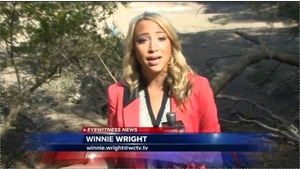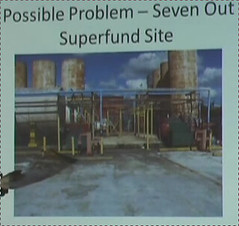 Flint Riverkeeper has a handy legislative update
about water bills in the Georgia legislature, one bad one before committee today: SB 299.
Flint Riverkeeper has a handy legislative update
about water bills in the Georgia legislature, one bad one before committee today: SB 299.
This bill would actually do away with the riparian buffers
that currently keep mud and sewage out of rivers and streams.
It’s up for a vote today in the
Senate Committee on Natural Resources and the Environment.
At least one Senator on that committee is in WWALS watersheds:
Tyler Harper, (404) 463-5263, (404) 463-4161 fax, Ocilla, District 7, (229) 425-4840.
You can contact him or your state Senator.
Here are
many reasons SB 299 is a bad bill.
 More reasons, by
Camo Coalition, of the Georgia Wildlife Federation, starting with:
More reasons, by
Camo Coalition, of the Georgia Wildlife Federation, starting with:
Siltation kills streams. Siltation can fill lakes making boat access
difficult or impossible. Silt destroys the habitat of aquatic
invertebrates—caddis flies, mayflies, stone flies, and such.
Pollutants can kill fish and these aquatic animals directly. Destroy
the food chain; destroy the fishery.
This bill is not anything like its name.
It’s actually a water grab that would
stuff Flint River water into our fragile Floridan Aquifer
and during droughts take it back out, but not for downstream use,
rather for shipping to Atlanta.
Even though it’s a Senate bill, it’s currently in the
House Agriculture and Consumer Affairs Committee, which has not
yet convened this session, so now is a good time to
contact your state rep.
Those in WWALS watersheds include at least:
-
Ellis Black, Valdosta, R-174, 404.656.0287, ellis.black@house.ga.gov
-
Amy Carter, Valdosta, R-175, 229.245.2733, 404.656.6801, amy.carter@house.ga.gov
-
Buddy Harden, Cordele, R-148, 404.656.0188, buddy.harden@house.ga.gov
The Flint River,
#2 on American Rivers’ most endangered rivers list, is
the next watershed to the west of us.
If this bill passes,
when will they come for the waters of the Little River, too?
Good Bills
 Here are some good bills that need support, with
descriptions from
Georgia Water Coalition’s current
legislative update, which covers the same bills as Flint Riverkeeper’s update.
Here are some good bills that need support, with
descriptions from
Georgia Water Coalition’s current
legislative update, which covers the same bills as Flint Riverkeeper’s update.
Extending the Ban on Aquifer Storage and Recovery
Continue reading →
 the Withlacoochee River in Georgia Water Coalition Dirty Dozen 2014
Item 9 as threatened by the Sabal Trail pipeline.
Sabal Trail’s Andrea Grover is “disappointed” in being on the Dirty Dozen;
does she also find it “hard to believe” like Sabal Trail’s well-documented
eminent domain threats?
the Withlacoochee River in Georgia Water Coalition Dirty Dozen 2014
Item 9 as threatened by the Sabal Trail pipeline.
Sabal Trail’s Andrea Grover is “disappointed” in being on the Dirty Dozen;
does she also find it “hard to believe” like Sabal Trail’s well-documented
eminent domain threats?










